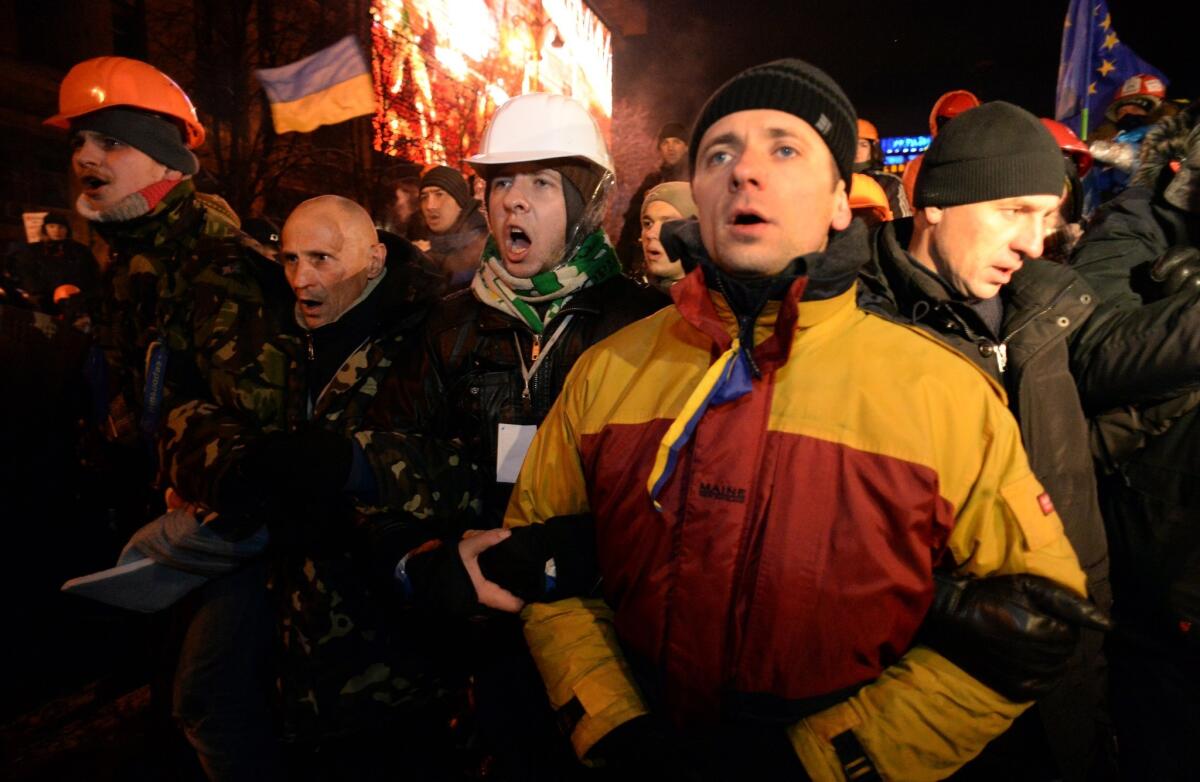Ukraine’s drama, Obama’s weakness

- Share via
Ukraine’s civil conflict strikes many Americans as a distant and unimportant dispute, one hardly connected to their daily lives. Such a lack of interest in international affairs is understandable, perhaps, because of the focus on economic recovery since 2008, but it’s badly misplaced given the stakes involved, not just in eastern and central Europe but around the world.
More alarming, and far less justifiable, as a cause for such inattention is the failure of America’s national political leadership. President Obama’s inattention to national security distinguishes him from his predecessors, Republican and Democrat alike, since Franklin D. Roosevelt.
Unlike them, his first thought every morning seems to be not the international threats facing the United States and its allies; rather, as he said in the 2008 campaign, his aim is to “fundamentally transform” America. Only when international affairs cannot be avoided or where potential domestic political gains are manifest (such as the killing of Osama bin Laden) does Obama emerge from his domestic policy bubble.
YEAR IN REVIEW: Washington’s 5 biggest ‘fails’ of 2013
Republicans also often ignore Obama’s indifference to national security. Perhaps they are uncomfortable with the issues, or perhaps they also see no political upside in focusing on international threats to America and our friends. Nor do the media help, giving, for example, limited coverage to a potentially stunning shift in Asia’s balance of power — namely, China’s aggressive bid to extend its control over contested airspace.
But none of these excuses is acceptable. Statesmen are responsible for seeing beyond today’s issues to protect larger U.S. interests well into the future. And if America lacks such leaders, we face no higher priority than finding new ones, and quickly.
Ukraine’s turmoil shows why. When the Soviet Union dissolved at the end of December 1991 and its constituent republics, some unwillingly, split off, the West had an enormous opportunity to bring these newly independent states into its orbit. The path was clear, as the central and eastern European states freed from the Warsaw Pact’s chains demonstrated by immediately seeking NATO membership.
YEAR IN REVIEW: 10 tips for a better life from The Times’ Op-Ed pages in 2013
Russia understood the stakes from the outset, but the West did not. By 2005, Russian President Vladimir Putin was saying unambiguously that the Soviet Union’s collapse was “the greatest geopolitical catastrophe” of the 20th century. His objective has consistently been reestablishing Moscow’s hegemony in the former Soviet Union’s space. While reannexation may not be his goal, Putin clearly wants to foreclose influence by outsiders.
The Baltic republics (Estonia, Latvia and Lithuania), which had never accepted being incorporated into the Soviet Union, quickly transitioned to the West. For others in Central Asia and the Caucasus, the path was inevitably harder because of their historical circumstances and ongoing conflicts among themselves, although some, like Georgia, nonetheless tried.
But the great prize was Ukraine, lying on the northern European plain, sandwiched between Russia and NATO. Democracy did not come easily to Ukraine because of decades of communist rule, and because of Russia’s repeated interference on behalf of its favored political leaders. Politics is often a blood sport in formerly totalitarian countries, and Ukraine is no exception. Former President Viktor Yushchenko, for example, was poisoned, and former Prime Minister Yulia Tymoshenko, the opposition leader, has been jailed on what many believe are trumped-up corruption charges.
Today’s conflict erupted after incumbent President Viktor Yanukovich declined to enter a long-expected economic deal with the European Union, either beguiled or coerced by Putin’s threats of economic reprisal by Russia. Given the EU’s ongoing difficulties, Kiev might well want to avoid trading one set of problems for another, but the real issue is not whether the EU or Russia should be its preferred economic partner.
The real issue for Ukraine (and the United States) is security. What the Baltic republics and the former Warsaw Pact members really wanted, after shedding the Soviet Union’s chains, was to join NATO, to prevent being reshackled. The EU certainly seems desirable — one more Western club to join — but it is decidedly secondary compared with avoiding being chained again by Moscow.
Thus the West collectively made a terrible mistake at the NATO summit in April 2008 by not placing Ukraine (and Georgia) on a clear path to NATO membership. Had we done so, the question of EU economic relations would doubtless have been more easily resolved. Ambiguity over Ukraine, leaving it in a no man’s land between Russia and NATO, obviously didn’t lead to Ukrainian stability, domestically or internationally. And the same vital question for Kiev’s citizens abides: Is their future with the West or Moscow?
It is hard to imagine that Obama gives even a passing thought to Ukraine’s drama, or many Republicans either, for that matter. But there should be no mistaking that tectonic plates are being realigned in Europe, for better or worse. America’s passivity and indifference will not make for a better outcome.
John Bolton, a former U.S. ambassador to the U.N., is a senior fellow at the American Enterprise Institute and the author of “Surrender Is Not an Option: Defending America at the United Nations and Abroad.”
More to Read
A cure for the common opinion
Get thought-provoking perspectives with our weekly newsletter.
You may occasionally receive promotional content from the Los Angeles Times.






